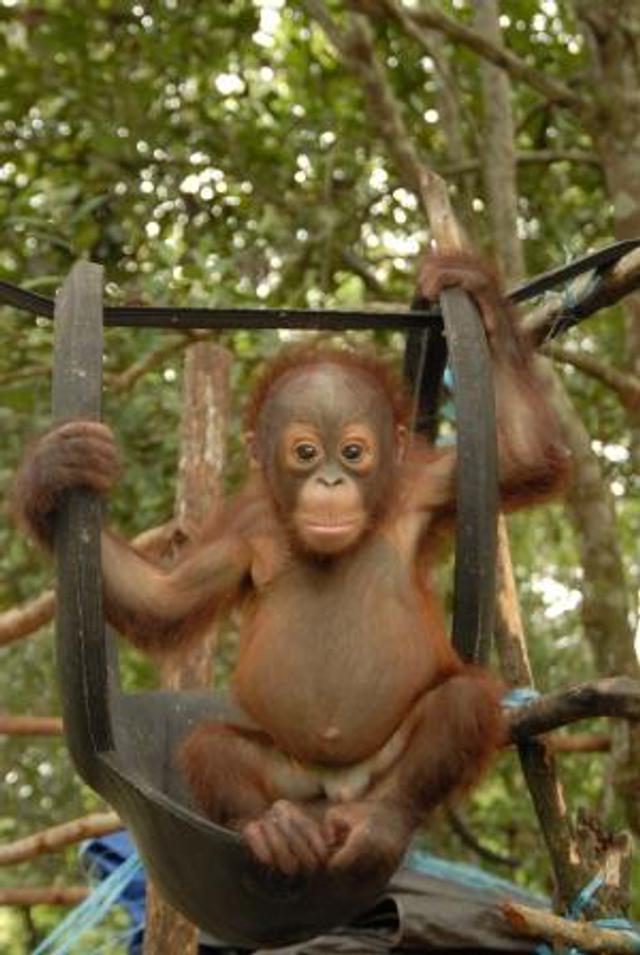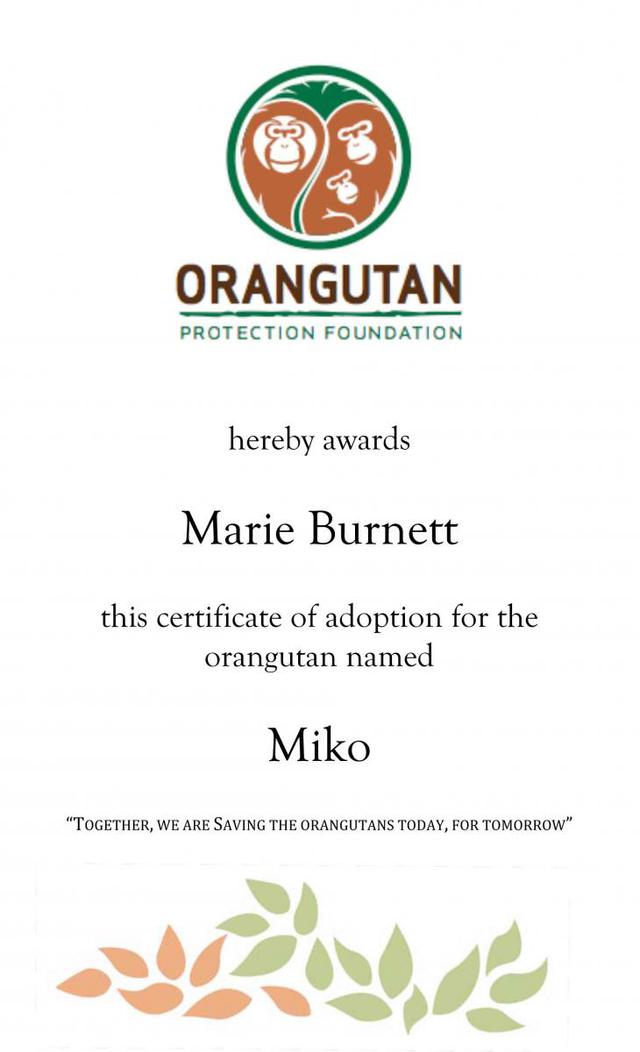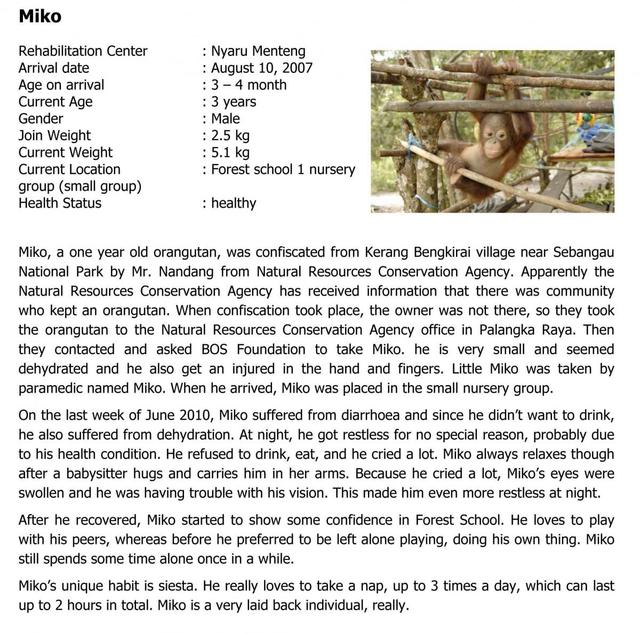The Orangutan Protection Foundation: adopt an orangutan
- Exhibited by
- Gráinne McIntee, The Orangutan Protection Foundation.
- Added
- June 11, 2013
- Medium of Communication
- Target Audience
- Individuals
- Type of Charity
- Environmental / animals
- Country of Origin
- Date of first appearance
- 2006
SOFII’s view
This has it all. Adorable apes being rescued from the evil plantation owners, a terrific 'adoption' programme that really captures the donors' attention, media coverage from the BBC. No wonder it is so successful. Don't you just love the photos of Miko?
Creator / originator
The BOS Foundation.
Summary / objectives
To bring our donors closer to the work of the Borneo Orangutan Survival Foundation (BOS) and to introduce a level of engagement to the relationship that makes them feel integral to the success of the protection of the orang-utan.

Background
As the rainforests are cleared, at the rate of an area roughly the size of two football fields a minute, to meet the ever-increasing demand for palm oil in developed countries, orangutans are being slaughtered as they venture into the plantations in search of food; their babies are torn from their arms and often sold into the illegal pet trade. Some survive but are too badly injured, malnourished or ill to fend for themselves and if they aren't found and taken to a rescue centre they too will die. Those fortunate enough to get to a rescue centre are cared for, nursed back to health and undergo a rehabilitation programme over a number of years until they're able to be released into the forest again.
The Orangutan Protection Foundation (OPF) is helping to fund the BOS Foundation's Nyaru Menteng Rescue and Rehabilitation Centre in Central Kalimantan, Indonesian Borneo, which has more than 600 orangutans in its care – ranging in age from a few months to approximately eight years.
Rehabilitated orangutans, however, will need to be returned to their rainforest habitat if the species is to survive, so we are also providing funding for Restorasi Habitat Orangutan Indonesia (RHOI). RHOI exists to identify and secure areas of rainforest that will provide a permanent and safe home for those orangutans who can be returned to the wild.
Our ultimate goal is the release of healthy orangutans back into protected rainforests to enable them to live in freedom, to procreate and to safeguard the survival of their species.
'Charity begins at home'. It is as true now as when the phrase was first coined. It certainly can make finding funding for charitable projects overseas more challenging, even more so when resources to build capacity and extend reach are limited. So what do you do? By recognising fundamentals of the human condition – the need to give and receive love and protection – you can fulfil a basic tenet of the charitable world: I (the donor) am a part of this animal's world and without my support he or she might not survive.
The adoption programme gives the adoptive 'parent' a strong degree of involvement. In addition to the welcome letter, which changes from time to time to keep it fresh, we send an adoption cerrtificate, photo and a short report on his rescue. Following this we send a birthdaly greeting and a written update. Each parent has his or her own password-protedted page and can login and read the story online. We write the stories from the babysitter's perspective to make them as authentic as possible. There is a video update and we also update regularly on social media and Facebook.
Photos, update stories on the orangutan's progress through the 'forest school' programme, a birthday greeting from the orangutan all serve to engage the donor and make her or him feel part of this orangutan's life. She becomes even more involved because, in most instances, the apes in the care of the BOS Foundation have lost their own mothers, been sold as babies into the illegal pet trade and kept in captivity for some time before being rescued by the BOS Foundation.
Special characteristics
Unlike some other adoption programmes in which you are adopting the species, by adopting an orangutan through the BOS Foundation the the donor gets to know the individual animal up close and personal: his or her character, likes and dislikes, and the progress she makes. Hopefully followed a few years later by an emotional goodbye when she is released back to the wild and disappears into the jungle canopy. It is a personal journey.
Influence / impact
In 2007 and 2009 the BOS Foundation was featured in the BBC's Orangutan Diary and the success of the adoption programme skyrocketed. In Denmark, where the founder of the Nyaru Menteng project was born, it also proved incredibly popular and raised enough to cover the running costs of a centre that currently looks after 650 orangutans and nearly 200 staff.
Results
Results have been mixed but, unsurprisingly, an increased media presence of the stories inevitably leads to increased public interest and engagement. A successful adoption programme is wholly reliant on a steady stream of progress updates such as the health of the orangutan, personality traits and quirks, etc. This is the means by which we build donor loyalty and is the key to maintaining that all-important loyalty on which charities rely and thrive. A lot of the credit for the power of these progress updates should be given to the local Dayak women, who take their duties very seriously indeed and whose love and dedication to their role as surrogates shines through to the donor.
Merits
As a tool of donor engagement, the adoption of an individual, whether animal or human, can truly enhance the charity/donor relationship. Constant follow-up and feedback are required to maintain that relationship, but once the donor sees the difference, (almost) in real time, that their contribution is making to the life of an individual ape and therefore to the species as a whole, the majority will want to see 'their ape done good', all the way to the jungle canopy and beyond.

 View original image
View original image
 View original image
View original image
Also in Categories
-
-

















